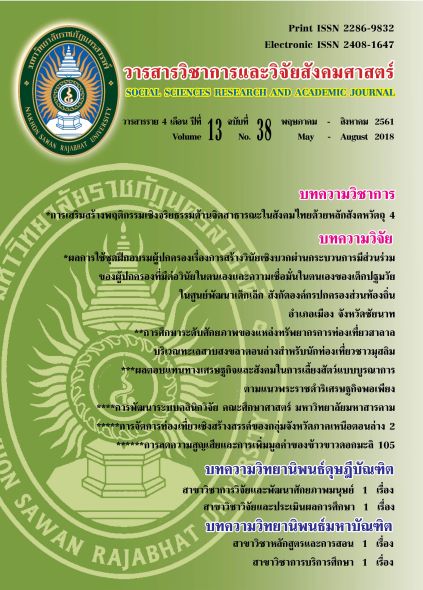การพัฒนาระบบคลินิกวิจัย คณะศึกษาศาสตร์ มหาวิทยาลัยมหาสารคาม The Development of Research Clinic System, Faculty of Education Mahasarakham University
Main Article Content
Abstract
การวิจัยครั้งนี้มีวัตถุประสงค์เพื่อพัฒนาระบบคลินิกวิจัย คณะศึกษาศาสตร์ มหาวิทยาลัยมหาสารคาม และเพื่อศึกษาผลการใช้ระบบคลินิกวิจัยที่พัฒนาขึ้น กลุ่มผู้ให้ข้อมูลได้แก่ ครูผู้สอนในระดับการศึกษาขั้นพื้นฐาน, นิสิตระดับปริญญาตรี โท และเอก, บุคลากรทางการศึกษา ได้แก่ ศึกษานิเทศก์, ผู้บริหารโรงเรียน และบุคลากรสายสนับสนุน, ผู้ให้คำปรึกษา (หมอวิจัย), ผู้ช่วยให้คำปรึกษา (นิสิตระดับปริญญาเอก) และผู้ใช้บริการระบบคลินิกวิจัยที่พัฒนาขึ้น เครื่องมือที่ใช้ในการเก็บรวบรวมข้อมูล ได้แก่ แบบสัมภาษณ์ความต้องการจำเป็นในการพัฒนาระบบคลินิกวิจัย, แบบสัมภาษณ์ผู้เชี่ยวชาญเกี่ยวกับแนวทางในการพัฒนาระบบคลินิกวิจัย, แบบประเมินระบบคลินิกวิจัย, แบบสอบถามความพึงพอใจของผู้ใช้บริการระบบคลินิกวิจัย, แบบสัมภาษณ์เกี่ยวกับระบบคลินิกวิจัย และแบบสอบถามความคิดเห็นที่มีต่อระบบคลินิกวิจัย วิเคราะห์ข้อมูลด้วย ความถี่และร้อยละ, , S.D., c2, F-test (Two-way ANOVA) และการวิเคราะห์เนื้อหา (Content Analysis) ผลการวิจัย พบว่า
1) ระบบคลินิกวิจัยที่พัฒนาขึ้นมีลักษณะเป็นกลุ่มขององค์ประกอบที่มีความสัมพันธ์กัน แบ่งเป็น 4 ส่วน ได้แก่ ปัจจัยนำเข้า กระบวนการ ผลผลิต และข้อมูลป้อนกลับ มีผลการประเมินในระดับมากที่สุด
2) ผลการใช้ระบบที่พัฒนาขึ้น มีข้อสรุปดังต่อไปนี้ ประเด็นที่ผู้ใช้บริการระบบคลินิกวิจัย มีความถี่สูงสุด ได้แก่ การสร้างและหาคุณภาพเครื่องมือที่ใช้ในการเก็บรวบรวมข้อมูล, สัดส่วนของประเด็นในการขอรับคำปรึกษาวิจัย แตกต่างกันอย่างมีนัยสำคัญทางสถิติที่ระดับ .05, ผลการศึกษาความคิดเห็นที่มีต่อระบบคลินิกวิจัย แบ่งเป็น 2 ส่วน ผู้ให้คำปรึกษา (หมอวิจัย) ส่วนใหญ่เห็นด้วยกับระบบคลินิกวิจัย (ร้อยละ 71.43 ถึง 85.71) , ผู้ช่วยให้คำปรึกษา (นิสิต ป.เอก) ส่วนใหญ่เห็นด้วยกับระบบคลินิกวิจัย (ร้อยละ 77.78 ถึง 100) และนอกจากนั้น ยังมีความเห็นว่าการได้มาปฏิบัติงานที่คลินิกวิจัย ส่งผลให้ความรู้ด้านการวิจัย, ทักษะการวิจัย, เจตคติต่อการวิจัย, การแก้ปัญหาเฉพาะหน้า และการตอบคำถามวิจัย เพิ่มขึ้น (ร้อยละ 100), ผู้ใช้บริการมีความพึงพอใจของต่อระบบคลินิกวิจัยในระดับมากที่สุด และนอกจากนั้นยังมีความเห็นว่าหลังจากเข้าใช้บริการคลินิกวิจัยตามระบบที่พัฒนาขึ้น ทำให้ความรู้ด้านการวิจัยเพิ่มขึ้น (ร้อยละ 99.26), มีเจตคติต่อการวิจัยในทางที่ดีขึ้น (ร้อยละ 94.46) และมีทักษะการทำวิจัยเพิ่มขึ้น (ร้อยละ 99.26), ผู้ใช้บริการที่มีเพศและสถานภาพที่ต่างกันมีความพึงพอใจต่อการใช้ระบบคลินิกวิจัยโดยรวมไม่แตกต่างกัน และมีผลกระทบในทางบวกทั้งต่อผู้ให้คำปรึกษา (หมอวิจัย), ผู้ช่วยให้คำปรึกษา (นิสิต ป.เอก), และผู้ใช้บริการ มีผลกระทบทำให้เกิดการบริการวิชาการที่เป็นรูปธรรม เช่น โครงการคลินิกวิจัยเคลื่อนที่ และเกิดเครือข่ายกับมหาวิทยาลัยและองค์กรทางการศึกษาอย่างหลากหลาย
This study aims to develop the research clinic system of Faculty of Education, Mahasarakham University and to investigate its outcomes. The participants in the study were school teachers, undergraduate and postgraduate students, educational supervisors, school directors, educational staff, research clinic consultants (also known as ‘research doctors’), research clinic assistants (Ph.D. candidates), and members of the research clinic receiving the counseling services based on the developed system. The instruments used to collect data were the interview form concerning the need assessment for the system development, the interview form regarding suggestions for system development from experts in the field, the evaluation form of the research clinic, the satisfactory survey of the research clinic services, the interview form pertaining to the research clinic system, and the questionnaire regarding opinions about the research clinic services. The data was analyzed by the following statistical methods: frequency, percentage, , S.D., c2, F-test (Two-way ANOVA), and content analysis. The study revealed the following results: 1) The four-section frameworks (input, process, output and feedback) of the developed system for the research clinic received the highest score from the evaluation. 2)The outcomes of the developed system revealed these conclusions : Constructing and validating the research tools in collecting data was highest frequency factors. The proportions of the issues pertaining to the counseling services have statistical significance at .05. The result from the opinions pertaining to the research clinic services was divided into two parts. The research clinic consultants (research doctors) mostly agreed with the research clinic system (71.43% – 85.71%). The research clinic assistants (Ph.D. candidates) mostly agreed with the research clinic system (77.78% -100%). Furthermore, they all agreed that their research knowledge and skills, attitude towards research, problem -solving skills, and research counseling skills were significantly increased (100%). The members receiving the counseling services were highly satisfied. In addition, they agreed that after receiving the counseling services using the developed system the following factors showed improvements: research knowledge (99.26%), positive attitude towards research (94.46%), and research skills (99.26%). Gender and social status did not significantly affect the overall satisfaction of the members receiving the counseling services. There were positive outcomes such as Mobile Research Clinic and network.
Article Details
References
ทวีศักดิ์ จินดานุรักษ์. (2560). การจัดการศึกษา 4.0 กับการพัฒนาประเทศที่ยั่งยืน. http://adacstou.wixsite.com/adacstou/single-post/2017/09/01/
นพวรรณ รื่นแสง และวรวรรณ สโมสรสุข. (2559). ปัญหา อุปสรรคและแนวทางการส่งเสริมการดำเนินโครงการวิจัยของ ผู้รับทุนสนับสนุนโรงพยาบาลธรรมศาสตร์เฉลิมพระเกียรติ. วารสารวิจัยและพัฒนา วไลยอลงกรณ์ ในพระบรมราชูปถัมภ์. 11(3), 207-218.
พงษ์ภิญโญ แม้นโกศล. (2559). กลยุทธ์การบริหารเพื่อความเป็นเลิศในงานวิจัยของคณะมนุษยศาสตร์สถาบันอุดมศึกษาเอกชน. วารสารสุทธิปริทัศน์. 27 (83), 15-26.
พระราชดำรัสและพระบรมราโชวาท ของในหลวงรัชกาลที่ 9. สืบค้นเมื่อ 9 กรกฎาคม 2561. จาก https://hilight.kapook.com/view/144197.
ภาควิชาวิจัยและพัฒนาการศึกษา. (2558). พื้นฐานการวิจัยการศึกษา. (พิมพ์ครั้งที่ 7). มหาสารคาม: ตักสิลาการพิมพ์.
ราเมษ ลางกระโทก เทพพร โลมารักษ์ และศรีเพ็ญ พลเดช. (2561). ปัญหาและแนวทางการบริหารงานวัดผลประเมินผลของโรงเรียน สังกัดสำนักงานเขตพื้นที่การศึกษาประถมศึกษาบุรีรัมย์ เขต 3. รายงานสืบเนื่องจากการประชุมวิชาการ (Proceedings) การประชุมวิชาการระดับชาติและนานาชาติ ครั้งที่ 2.
อนุชาติ อินทร์ชนะ, วริศรา พุทธสวัสดิ์ และอาจารี นาโค. (2557). ระบบสารสนเทศการให้คำปรึกษาของอาจารย์ที่ปรึกษาทางวิชาการ ของมหาวิทยาลัยทักษิณ. วารสารมหาวิทยาลัยทักษิณ.7 (3), 239-246.
Bernard, H. Russell. (2013). Social research method : qualitative and quantitative approaches. (2nd ed).. Los Angeles : SAGE.
Dennis, A., Wixom, B. H., & Tegarden, D. (2015). Systems analysis and design: An object oriented approach with UML. New Jersey: John Wiley & Sons.
DeVellis, Robert F. (2012). Scale development : theory and applications. (3rd Edition). Thousand Oaks, Calif : SAGE.
De Vaus, D. A. (2012). Research Design in Social Research. London: SAGE.
Knott, Anne M. (2013). R&D Mythbusters. Innovation and Growth: What Do We Know? /editor Anjan Thakor. ingapore ; London: World Scientific.
Neuman, W.Lawrence. (2014). Understanding research. Harlow: Pearson.
Punch, Keith F. (2012). Developing effective research proposals. (2nd Edition). London : SAGE.
Thomas, Gary. (2013). How to do your research project : a guide for students in education and applied social sciences. (2nd Edition).


